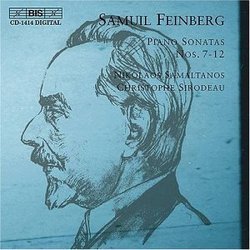| All Artists: Samuel Feinberg, Christophe Sirodeau, Nikolaos Samaltanos Title: Samuil Feinberg: Piano Sonatas Nos. 7-12 Members Wishing: 0 Total Copies: 0 Label: Bis Release Date: 3/30/2004 Album Type: Import Genre: Classical Styles: Chamber Music, Historical Periods, Classical (c.1770-1830) Number of Discs: 1 SwapaCD Credits: 1 UPCs: 675754705626, 7318590014141 |
Search - Samuel Feinberg, Christophe Sirodeau, Nikolaos Samaltanos :: Samuil Feinberg: Piano Sonatas Nos. 7-12
 | Samuel Feinberg, Christophe Sirodeau, Nikolaos Samaltanos Samuil Feinberg: Piano Sonatas Nos. 7-12 Genre: Classical
|
Larger Image |
CD Details |
CD ReviewsAngst, Delirium, and Sublimity - Feinberg's Sonatas Hexameron | 03/01/2008 (5 out of 5 stars) "Samuil Feinberg's (1890-1962) piano sonatas are some of the best kept secrets of 20th century Russian piano music. Few classical music listeners have even heard of Feinberg. Perhaps his name, hyphenated with Bach's, may appear from time to time on various Bach transcription recordings. Other than that, his original music, notably his 12 colossal piano sonatas, have not been discovered until now. The previous volume in this series showcases Feinberg's first Six Sonatas, where the influence of Scriabin is pronounced. Actually, Feinberg has his own voice and his music is far from derivative. These works are highly virtuosic and the technical demands make even Scriabin's sonatas sound lightweight. Feinberg also treads darker paths of expression with greater depth than Roslavets and a biting potency that surpasses Scriabin. After digesting the last six sonatas on the present recording, I am convinced that Feinberg's oeuvre is the Lost Atlantis of Russian music. While his piano music shows some stylistic hints of Scriabin, Roslavets and other Soviet composers, Feinberg's music is its own breed. Nothing I've heard really compares to it. The Seventh Sonata, for instance, covers a vast range: melancholic impressionism, polyphonic density, and frightening turbulence. Underneath the gorgeous music is excellent motivic unity and thematic ideas. The transfixing eeriness of the "Larghetto" moves perfectly into the dramatic "Epilogue." Feinberg's Eighth Sonata is a magnificent tapestry of expressive power: the first movement is surreal and melancholy; the contrasting "Andante" has a nostalgic air while the "Allegro" is a nightmarish final statement. Feinberg's efforts to say something new in each of his sonatas reminds me of Beethoven. Where Feinberg's Seventh and Eighth Sonatas are like diverse siblings, the single-movement Ninth is terra incognita. It begins in the upper registers of the piano in a frisky and scherzoish manner, as if Mendelssohn's elfin writing has been updated for the 20th century. Feinberg journeys away from his customary darkness and further into a magical realm. He creates interesting sonorities of pianissimos with fortissimos and simultaneous sforzandos in the highest and lowest registers of the piano. But in an unbelievable turn of events, Feinberg's skittish writing becomes a tour-de-force of virtuosity and drama. The tempo and activity increase to heights of madness culminating in a whirlwind of descending scales that sound like the product of two pianists. Then a powerful and transcendent harmonic sequence takes over, and I'm left breathless every time I hear it. Feinberg's ability to do so much in one sonata continues in the Tenth, a single-movement powerhouse of a composition. There is a capricious but wonderful array of emotions present: fear, hope, death, pain, and triumph. The greatest moment evolves from the funeral march in the center of this work: a sublime series of descending chords and rip-roaring octaves that function for expressive purposes and not decoration. The emotional power Feinberg achieves in a matter of seconds is phenomenal. So where does Feinberg venture in the last two sonatas? The Eleventh emerges from darkness and into happier thoughts. It's amazing that this work dates from 1952 because it sounds far more "Romantic" as if recalling late Liszt. Even the Twelfth shows greater simplicity with its three compact movements; it was written in the last year of Feinberg's life and shows imaginative structure and music content. Bottom line: Fans of Scriabin, Myaskovsky, Roslavets, Alexandrov or any Russian piano music must familiarize themselves with Feinberg's music. Like Alkan, Feinberg is a forgotten pianist-composer and a genius, I think. His piano music is some of the most rewarding specimens I've ever encountered in the Russian piano literature." Feinberg As Composer-Pianist Alscribji | Washington, D.C. | 02/10/2006 (5 out of 5 stars) "This is the first recording I have heard of Samuel Feinberg's piano music. Of the six sonatas recorded on this CD, three are world premiere recordings (#'s 7,8,9). If you like (or looking for) little-known, but good piano music, this is one CD to own. I am drawn to the piano music of Scriabin, Roslavets, and Sorabji, and the Feinberg sonatas "fit" into this kind of musical landscape. Although I am totally unfamiliar with the two pianists on the CD (Nikolaos Samaltanos performs #'s 9,10,11, and Christophe Sirodeau performs #'s 7,8,12) their performances are very well executed. It takes a certain type of pianist to perform this kind of music effectively. These two pianists seem to measure up to the demands of Feinberg's musical language for the piano. The music here is not as dark and bombastic as Scriabin, not as monstrous as Roslavets, and not as ornate as Sorabji. But it possesses qualities that easily thrust it into the category of music of a Romantic expression distilled through a keen intellect that has searched and found its own truth. The seventh sonata easily pursuades this conclusion. For pianophiles, this CD should be in their library."
|

 Track Listings (12) - Disc #1
Track Listings (12) - Disc #1